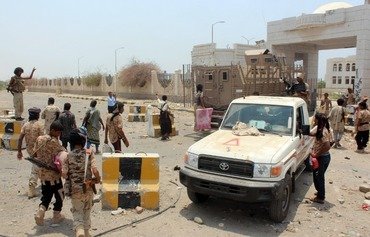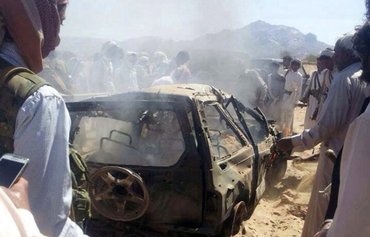Al-Qaeda's recent emphasis on ambushes and random assassinations as a means to assert its presence in Yemen is a sign that its ability to carry out major attacks has been compromised, researchers tell Al-Mashareq.
In recent weeks, al-Qaeda elements have conducted sporadic assassinations of soldiers and officers, such as the July 29th attack on a vehicle carrying a high-ranking military officer as it passed through the Muhaidan area in Abyan's east Loder district.
Col. Nasser al-Jaari, who was killed in the attack, had taken part in the military operations that liberated Abyan from al-Qaeda in August of last year.
Al-Qaeda elements also ambushed and killed three members of the Yemeni security forces on July 25th near an army checkpoint in Hadramaut's Adh Dhliaah district.
Gunmen also shot dead Nasser al-Humeiri, the chief of security in Shabwa province's Rudum district, on July 22nd. According to local security sources, he was attacked by al-Qaeda in Hadramaut province's Ghail Bawazeer district.
Despite these sporadic attacks, it has become clear that al-Qaeda no longer is able to plan and conduct all-out attacks in Yemen, political analyst Tareq al-Zuraiqi told Al-Mashareq.
Opportunistic attacks
"The operations al-Qaeda is currently carrying out in Yemen have no impact and are aimed at saying that the group still exists," he said.
These simple, random attacks on military outposts or ambushes targeting military commanders are a far cry from the massive attacks it has carried out in the past, he said.
These include the December 5, 2013 attack on al-Ordhi Hospital in the Ministry of Defence compound, in which al-Qaeda in the Arabian Peninsula (AQAP) killed 56 people and wounded more than 150 others, among them doctors, nurses, patients and civilian and military visitors.
Al-Qaeda elements also attacked a military base at Yemen's Aden airport on July 6, 2016, in the early morning hours of Eid al-Fitr, killing at least 10 soldiers.
"Al-Qaeda is currently only active when the opportunity presents itself, as a result of the crackdown on it and its expulsion from the areas it once controlled," said researcher Saeed al-Jamahi, who studies armed extremist groups.
Many of its prominent leaders have been killed in airstrikes, he told Al-Mashareq, and the sporadic attacks the group has been carrying out are part of a strategy to catch its breath and regroup, he added.
Dwindling resources
Al-Zuraiqi attributed the group's weakness at this stage to its "dwindling financial resources" and its "loss of the social support base that served as its safe haven".
"Al-Qaeda used some of the money it received to expand its influence among the tribes," he explained, but that influence is in steady decline with tribes pushing back against the remaining pockets of al-Qaeda in their areas.
Attacks by the Yemeni army, with backing from the coalition, on al-Qaeda strongholds have wiped out the group's remaining capabilities, he said, noting that it is now unable to regroup.
Political analyst Adnan al-Humeiri said that al-Qaeda is now carrying out operations without a strategy or objective, which indicates "it is floundering".
Al-Qaeda's financial resources have dried up, he said, remarking that the group’s weakness may force it into an alliance with the "Islamic State of Iraq and Syria" (ISIS).

![Yemeni forces head to the Abyan province capital of Zinjibar to launch an offensive to recapture the town from al-Qaeda in this file photo from August 14th, 2016. A year later, al-Qaeda has been reduced to carrying out sporadic attacks in the province, experts tell Al-Mashareq. [Saleh al-Obeidi/AFP]](/cnmi_am/images/2017/08/18/9212-Yemen-forces-zinjibar-600_384.jpg)






